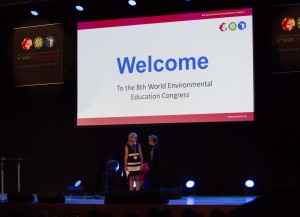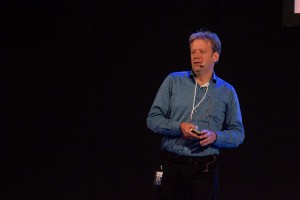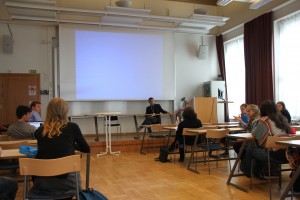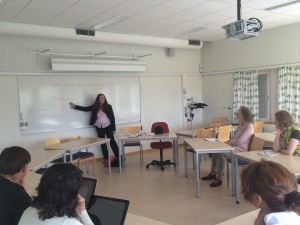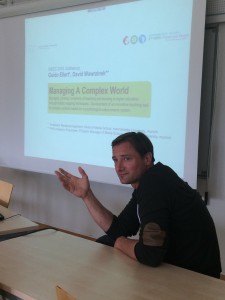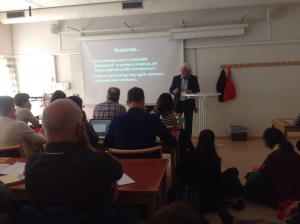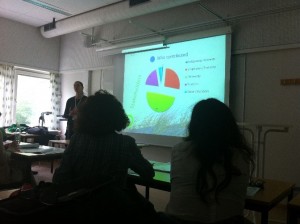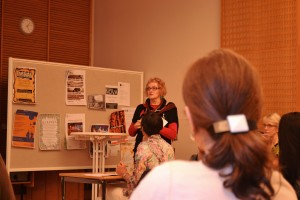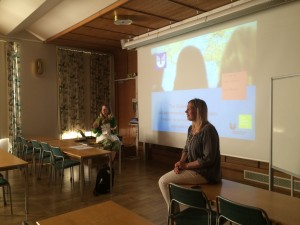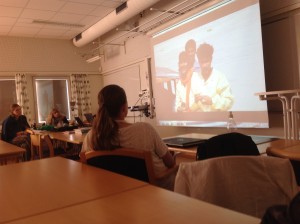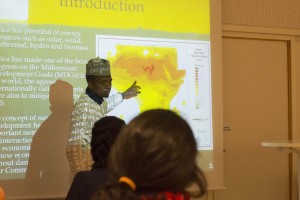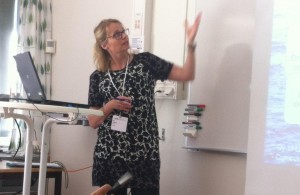WELCOME TO WEEC 2015
Take all on board through education
The relationship to our nature can be shown trough the dance. That’s what opening session of WEEC 2015 showed us in the beginning. This event was moderated by Katarina Gårdfeldt, Director of the Centre for Environment and Sustainability at University of Gothenburg and Chalmers University of Technology, Gothenburg, Sweden.
The first speaker, Ingrid Pramling Samuelsson, Professor and coordinator for early childhood education at University of Gothenburg, was talking about the need of environmental education in our society and also underlined that it should be available to everyone – to boys and girls, to northern, western, southern and eastern countries, to people in every age.
Mario Salomone, the Secretary-General of the WEEC Permanent Secretariat, compared people on the congress to famous Jules Verne’s character from the novel Around the World in Eighty Days, Phileas Fogg. Phileas was always trying to make this planet a better place, just like all the participants in WEEC does.
Pam Fredman, Vice-chancellor of University of Gothenburg, tried to show us the power of the cooperation between politician, economist, private sector and others. Everyone is responsible, but in different spheres. Students are our future, so universities have the key role in sustainable development. Also international cooperation between universities to promote the higher education is important.
John Holmberg, the Vice President of Chalmers University of Technology in Gothenburg, has told us what the goals of sustainable development are. He has pointed out the transformation and integration. Transformation means that we have to quickly change the system with a high intensity and integration means that we have to work together on more goals at the same time. He has underlined the importance of students as well. They have to learn how to think, not just memorize the facts. So we should not just give them answers, but mainly ask the questions. We have to create a trust through listening, observing and understanding. He ended his speech by Gandhi’s quotation “You must be the change you wish to see in the world.”
Some of the speakers shared their message through the video. One of them was Irina Bokova, the Director-General of UNESCO. She talked about the importance of green economies and the green society. According to Achim Steine, the Executive Director of the United Nations Environment Programme, the problem is that we learn a lot, but we don’t act. We need to do something for sustainable living.
“We are drowning in information while starving for wisdom”, said Arjen Wals, a Professor of Social Learning and Sustainable Development. People and the planet should develop together. There is two times more people on the earth, and they are two times healthier than in 1972, but on the other hand there is two times less of the earth supplies. He also highlighted that blurring the boundaries between institutions, community-based and workplace learning are essential and inevitable. He also expressed the importance of critical thinking. The normative dimension (values, ethics) of environmental and sustainability education needs to be strengthened if a transition perspective is to be taken seriously.
The opening session has opened eyes of all the participants. These eyes now see the change.
Katarina Gårdfeldt
Arjen Wals
Article written by: Natália Mrázová (22) and Marek Mihok (20), Slovakia
30 June 2015
YRE students
WEEC 2015, Gothenburg
__________________________________________________________________________
Learning in vital coalition for green cities
In the last 100 years the balance between fat as a resource and fat as a waste product has become disrupted - said Dario Padovan from Department Culture, Politics and Society,UNESCO Chair in Sustainable Development and Territory Management University of Turin, Italy presented experience from workshop for 15 academicians from England, Italy, India and also many different countries.
As a result from the workshop he presented that in urban metabolism model “obesity” is the processes through which fat travels through bodies, infrastructures, and cities and settles unevenly. People living in city environments, where healthy food is hard to find, health care is poor, junk food is easy to find, the weather discourages exercise, pollution rates are high and long commutes steal exercise time, is more likely to be fat. Researches show close interconnections between strategies for slimming down bodies, infrastructures, and the city as a whole: strategies which involve different visions of the problem and solutions which are not necessarily mutually exclusive. If obesity, fat city, food desert, food racism and food waste are the negative aspects of the matter, food democracy, food sovereignty and food citizenship represent possible solutions.
To tackle and reduce obesity it is necessary moving beyond the limiting notions of food as commodity, people as consumers, and society as marketplace. Food democracy is about citizens, who actively participate in shaping the food system, by building sustainable food systems that protects their natural environment, sustains farmers, nourishes families; guaranteeing the right to a nutritious and sufficient diet for all; determining agro-food policies and practices locally, regionally, nationally, and globally. Food, like no other commodity, allows for a political reawakening.
This workshop intends to provide an opportunity for UNESCO chairs worldwide, operating in fields related to environmental sustainability and sustainable development and addressing issue as food desert, food racism, food waste, food citizenship, sustainable agro-food system and network, to connect to each others.
The workshop aims to bring together the state of the art research and thinking in these areas, proving insight that may contribute to a better understanding of these questions and more effective action and policies to cope with. The presentation opened a great discussion they contributed from unique perspective and background, reflecting on approaches and methods, presenting researches and projects.
Article written by: Gülce Odaman, 17
30 June 2015
YRE students from Turkey
WEEC 2015, Gothenburg
________________________________________________________________________
Mind the gap! Moving from awareness to action.
Education has always been more than the mind alone, and it certainly has needed to be more than “training” in service to only economic and development roles in our respective societies. Education, literally the framework of any culture’s transmission, is essentially the definition of that culture’s values, history and truth. Thus education performs its most critical role in attempting to hold that culture together in heart, soul and shared spirit, as well as history.
This conclusion was presented by June Gorman during the workshop Mind the gap! Moving from awareness to action. She is the founder, Transformative Education Forum (TEF-Global.org), London, Learning Research Fellow, Schumacher Institute, Bristol, United Kingdom. Her heading is ‘Mindfulness vs. Brain-full-ness’ Format of the presentation was a round table. There were all age groups and nationalities.
Interestingly, that the very part of education are the emotional, social, cultural and environmental intelligences – strategically left out of recent, “modern”, economic development foci of the heavily promoted economically argued emphasis on Science, Technology, Engineering and Math (STEM), alone. Subsequently the resulting cognitive dissonance created by this very Western Enlightenment education emphasis now imbalanced to the more linear left-brain hemisphere, subverts that very future. It actually leaves out these critical deeper and potentially more “transformative” conversations at the heart of humanity’s value systems and philosophies of meaning, that new learning neuroscience attributes more dominantly to the right-hemisphere of the brain. This is because at the root of purely “scientific” definitions, is an unexamined subjective tendency to label and invalidate these areas of human study, as inherently unscientific, irrational and in many cases, “primitive or superstitious”. This works to the detriment of all philosophical, value and moral systems thinking and questioning at the base of every conversation of “sustainable development”, most critical to achieving it.
Simply put, without that conversation, the other solely economic and technical one is not only essentially meaningless but leaves most of us in a rut of bankrupt cultural values that leads to hopelessness, apathy and the lack of interpersonally-empowered motivation necessary to transform things for the better.’
During the discussion initiated on the end of the session all the participants express their thoughts.
Article written by: Bianca BRAGGİOTTİ (18), Emre SUSUP (17)
30 June 2015
YRE Students, Turkey
WEEC 2015, Gothenburg
________________________________________________________________________
Sustaining Further: What’s After Sustainability?
This afternoon, Humanisten building welcomed three venerable guests who shared their thoughts with those who were intrigued by the theme of (re) emerging concepts for environmental stewardship and sustainability.
The oral presentation started with Bob Jickling from Lakehead University, Canada. He set together different uses of the term “sustainability” and underlined the shift in meaning which causes an uncertainty about what will come next once education for sustainable development is established.
Then he explained the criticism towards this situation described by some scholars as an “empty signifier” which does not actually promote change, when some scholars interpret it as a benefit since they believe the solution can rise from such disagreement.
Following him, Sean Blenkinsop from Simon Fraser University, Canada took the stage and expanded on the idea that the term is being used to serve other purposes than fully promoting the change. Referring to Albert Camus’ pieces such as the Plague and drawing similarities between Camus’ view on suicide and the topic at hand, he proposed the ‘rebel’ teacher actually can promote sustainable development.
The final speaker for this session, Lucie Sauve (from Université du Québec à Montréal, Canada) took the floor to provide ellaboration to different concepts and how cosmopolitics can play a role in educational advancement.
Each speaker entertained questions from the participants and allowed a broader discussion. An important question to mention was regarding to those teachers who don’t want to be rebels, but rather remain reluctant to change. Mr. Blenkinsop answered that students can be a factor to redirect such personas towards more innovative techniques, to access a better learning environment.
Personally, from a student’s perspective, I also observed that the term sustainability is not very well comprehended and sometimes intentionally altered to create ambiguity. However, I believe that sustainability is not alone to be such a word as there are other concepts, which have definitions that can not be perfected. The list includes “freedom of speech” which has a definition that changes from country to country and constitution to constitution and also “genetically modified organisms” which corresponds to a different comment in every inquisitive mind. Therefore, agreeing with all the presenters who were among us today, I believe that the solution towards sustainable education is through discerning fundamental principles rather than definitions in order to let definitions grow on their own in accordance with the thoughts of the region and people. This way, a more flexible sense of meaning can be achieved to accommodate many ideas under one umbrella without yielding to vagueness. By integrating such a level of freedom into the understanding of this term, the process towards sustainable education and afterwards may be smoothened.
Mr. Jickling lists the criticism towards the term sustainability
Article written by: Sadi Can Sönmez (18)
American Collegiate Institute, Turkey
30 June 2015
YRE students from Turkey
WEEC 2015, Gothenburg
___________________________________________________________________________
GRADING THE FIELD OF ENVIRONMENTAL SUSTAINABILITY
During a short oral presentation at the World Environmental Education Congress, WEEC2015 in Gothenburg, Dr. Bonnie McBain explained the educational standards for environmental and sustainability degrees which she had developed for universities in Australia.
McBain, who has always been involved in the ‘green scene’, worked with various individuals, from numerous universities around Australia to work on a twelve month long project. The project aimed to create specific learning standards for students studying within the environmental and sustainability subject area.
The team was asked by the Australian Council of Environmental Deans and Directors to develop the standards or TLOs (threshold learning outcomes) for Bachelor degrees, Bachelor Honours degrees, Graduate Diplomas and Masters Degrees, clarified McBain.
The project was funded by the Australian Government Office for Learning and Teaching as well as some personal funding done by the team leaders.
During the yearlong project the team drafted simple requirements which aimed to cover the diverse subject of environmental sustainability, they then had them checked and critiqued by members of the public in Australia over a period of six months.
There were a total of seven workshops set up in Australia; along with 850 online invitations to fill out a questionnaire.
From the combination of these two things, McBain said the team was able to talk to people from indigenous tribes, businesses, as well as university students, school students, and other educators.
Over 2500 pieces of advice were received; with the indigenous people being the highest contributors to the project, and some of the most important helpers, added McBain.
After editing the environmental and sustainability education standards using the advice received, the team published four criteria. These included transdisciplinary knowledge, systematic understanding, skills for environment and sustainability and finally, ethical practice.
McBain also remarked that the most challenging aspects of creating the standards was the huge diversity of possible jobs in the subject area; as well as gathering numerous public opinions. She also added that the inspiration for most of the final standards came directly from the great participation of the public.
The now few month old standards are being put to use by three universities and counting in Australia. In the upcoming years McBain and her team hope to assess the results of students who were testing using the new standards.
As a young reporter, advocating for the focus on environmental sustainability, I felt McBain and her team had done a good job in assessing what is important in the field on both an understanding and practical level. By involving members of the public on such a grand scale I also feel that it was a great chance for people to learn about what people in the field of environmental sustainability do, and how important it is for us all in the future. I hope the standards can spread to more universities around Australia as people studying environmental sustainability also increases.
Article written by: Emma Hindle (16)
International School of the Gothenburg Region
Young Reporters for the Enviornment
29/06/15
___________________________________________________________________
The Seed Will Not Be lost – Children are the Future of Sustainability
There is very little research about early childhood education for sustainability, which these nine women, who talked at Monday during the symposia of theme 1 at the WEEC 2015 congress, consider a problem. Not only that, but children are not being taking seriously regarding sustainability. People are underestimating children’s knowledge, which is the second problem that was discussed at the symposia.
The symposia about taking children seriously in addressing global challenges begins with Julie Davis, associate professor in the school of Early Childhood, Queenland University of Technology, and Sue Elliott, senior lecturer in the school of education at the University of New England. They start by presenting their book Early Childhood Education for Sustainability that was published this year, 2015, and it is the base of this whole symposia. Davis and Elliott wrote the first few chapters of the book about their research regarding early childhood education for sustainability. What they found during their research was a lack of information about this topic. People do not know everything there is to know about early childhood education for sustainability.
Next, Michiko Inoue, professor in the school of early childhood, faculty of education at Osaka Ohtani University, Japan, talks about the perspective on early childhood environmental education in Japan. She mentions that many people, both teachers and parents, think young children are incapable of thinking, especially when it comes to sustainability. But this is wrong, according to these women who talked during this symposia. Children are able to think critical about sustainability.
Glynne Mackey, senior lecturer in early childhood programs at the University of Canterbury, Christchurch, New Zealand, highlights the importance of listening, hearing and feeling children’s voices, much like Inoue. “- The seed will not be lost. Children are the seeds and the future of sustainability”, said Mackey.
Barbara M. Sageidet, associate professor at the department of early childhood education at University of Stavanger, Norway, focuses about how Norwegian kindergartens are working with sustainability. Many kindergartens are members of environmental organizations such as Eco-Agents and have projects each year to achieve the “green flag” certification from Foundation for Environmental Education. She says that preschools might actually work as role models for others.
Then Eva Arlemalm-Hagser, senior lecturer within teacher education at Mälardalen University Sweden and Ingrid Engdahl, deputy head of the Department of Child and Youth Studies at Stockholm University Sweden, were talking about Swedish preschools. According to them, Swedish preschools are addressing sustainability, but without conscious. Arlemalm-Hagser summed it up that Sweden is quite strong when it comes to working with sustainability development at preschools, but it can become better.
Next up to talk was Okjong Ji, professor in ECE of KNUT, Korea. Her talk was about a project made at S kindergarten in Korea for No Paper Day. What the kindergarten did was to recycle old books by selling them and then donate the money to UNICEF to help children in Nepal. This proves that the seven R:s; redistribute, recycle, reduce, reuse, rethink, reflect, respect, are possible to work with children.
Lastly, Lyndal O’Gorman, senior lecturer and researcher in Arts and Education for Sustainability in QUT school of Early Childhood Australia talked about integrating arts and sustainability. Art can provide us with multiple languages to express big ideas. Also, it enhances critical thinking, problem solving and openness to change. Both are transformational as sustainability should be.
The audience was after these nine presentations allowed to ask questions, which some did. One question was if people really think children can’t think critical, and the answer was a clear yes. People do not know enough about early childhood education about sustainability and therefore children are sometimes expected to not know anything about the environment. That concludes this symposium.
As a Young Reporter I thought the symposium touched upon an important topic that should be discussed much more today. We see children as incapable of critical thinking when they in fact can understand and reflect much more than we think. We should enhance this and work with the children instead of for them.
Julie Davis
Article written by: Cassandra Gustavsson, 17
NTI Mediagymnasiet Göteborg
30 June 2015
YRE students from Sweden
WEEC 2015, Gothenburg
_________________________________________________________________________________
The Global School – a programme for implementation of global and sustainable learning
How to find active and participatory methods of teaching and learning and used the concept of global journeys to enhance engagement and understanding?
We attended to the workshop titled ‘The Global School – a programme for implementation of global and sustainable learning‘ presented by Malin Gemzell and Anna Mogren from The Global School, Swedish council for higher education, Visby/Stockholm, Sweden.
In this workshop school experiences on sustainable education were shared. After this participants worked in small group. By the merry-Go round activity, which is based on brain-storming, it is provided that, participants can discuss on different examples of education for sustainable development (ESD) from their countries.
Through the work of the related group of academicians which was comprised of interdependency and exchange program for students, we learnt that the education of values such as human rights, ecology, health, freedom of religion, etc. was crucial.
They shared that, they helped schools to find active and participatory methods of teaching and learning and used the concept of global journeys to enhance engagement and understanding. In order to reach more people, they gave seminars over 5000 participants and made international visits. They declared that they couldn’t find the answer of the question, “What is the best approach for providing the sustainable development in schools?” By the help of these kind of studies, they had a chance to make mutual consultation with the academicians who are the participants of the seminars to find answers.
With this workshop we realized that these kind of programs need mutual consultation in order to be developed. Brain storming and sharing the ideas from different cultures are the crucial mechanisms of education for sustainable development. Working together with the academicians increases the value of the studies for the schools. As a result of this, the value of the education given inside the classroom increases in the light of the knowledge of sustainability.
Malin Gemzell and Anna Mogren
Article written by: Bianca BRAGGİOTTİ (18)-Emre SUSUP (18)
Saint-Joseph French High School, Turkey
30 June 2015
YRE Students, Turkey
WEEC 2015, Gothenburg
___________________________________________________________________________________
Transforming Crises into Solution
How do you provide education when it floods eight months a year? How do you provide electricity for students to simply study at night when on-grid solutions are not available? How can the local farmers adopt modern farming techniques when they cannot be informed? Km Taj-Biul Hasan presented his innovative answer to all these questions today with the project called: “Education on the Boat: Hope for Tomorrow.”
Addressing the theme of Education and Learning for Climate Change, Mr. Hasan, from Educational Film and Television Department of Dhrupad Communication, Bangladesh, first explained the prior situation in the region of “Cholon Beel.” Comprised mainly of wetlands that remain flooded for the most of the year, Cholon Beel and its inhabitants are dependent on fishing and limited agriculture. This, aggravated by the climate change, which increases unpredictability regarding the range and duration of the floods, obstructed the citizens from basic human needs, let alone education.
Like the rays of sun pervading through rain clouds, an idea was initiated in 2004 by a national organization to alleviate the harsh effects of the climactic conditions in the territory. Mr. Hasan moved on with how the project was launched and proliferated. He emphasized that the creation of boats was an integration of the local and modern, a system that embodies the real innovation. The boats were manufactured from locally elicited materials when local teachers were designated to offer education in them. Solar panels and re-charge stations were established inside the boats as a modern solution to the problem at hand. From this combination, the door to opportunities was opened.
Mr. Hasan told the participants that the literacy rate was increased to 22% from a total of 0 since the application began. Nearly 90.000 families benefited from this project regardless of age and gender as not only children but also farmers, housewives and anyone willing to participate were included. Upon being asked about the funding of the project, he clarified that it was a joint responsibility of both the government and the related organization.
He concluded his presentation with the film he actually took major part to make. The film not only included the technical aspects of the issue, but also included local elements, traditional music and the point of view of the citizens, which shed more light unto how the project changed lives. In an overall approach, it displayed how a crisis could be turned into solution.
To present my own perspective on the issue, I would like to state that I am once again impressed by how a single idea can grow to effect more people every single day once it’s planted. This innovation in Bangladesh is just one piece of the puzzle that has its foundation at the local basis, but grows towards the international. I believe that, after participating in this outstanding presentation, the key to solution lies almost always at the local basis. Also being one of the principles of YRE, information regarding to the community around us with a short radius is vital for environmental prosperity. Thus, the bigger and international solution is formed by the linking of different ideas formed locally, interconnected with each other.
If academicians and regional authorities can integrate this into the educational system and direct the people towards their own community, the awareness raised will eventually and inevitably lead to a global understanding of the need for change. Creating an accumulation of knowledge in generations to follow, it will not only turn us into better inhabitants of the world, but also increase our chances of survival against floods, hurricanes, droughts and other adverse effects of global climate shift.
Article written by: Sadi Can Sönmez (18)
YRE students from Turkey
30 June 2015, WEEC, Gothenburg
_____________________________________________________________________________________
THE ENERGY REDEMPTION
Africa is a place where one of the best progress on the Millenium Development Goals (MDGs) has been done. Although that fact there is a poverty. How can we alleviate it?
The answer on that question was given by Usman Muhammad from Centre for Renewable Energy and Action on Climate Change in Nigeria.
MDGs are caused by a trend to build a smart off-grid energy generators in rural Africa. There are plenty of energy resources such as solar, wind, geothermal and biomass so Africa has a big potential in the field of renewable energy. It is necessary for Africans to improve their livelihoods by accessing affordable sources of modern energy. Of 140 developing countries, 17 countries have targets for access to modern fuels and five countries access to mechanical power. Usman has shown a triangular solution to energy poverty – accessibility, availability and affordability.
In spite of that there are more and more electricity generators, there is an electricity crisis. The existing production capacity cannot meet the growing demand for electricity. Without the energy economy can’t grow as we can’t grow without food.
Usman Muhammad
Article written by: Marek Mihok, (20)
YRE students from Slovakia
30 June 2015, WEEC, Gothenburg
__________________________________________________________________________________
PROJECT WATER
Let’s talk about water. Most of us have it streaming out of our tap whenever we want it, but do we really understand it? Sara Brogaard and her team think not, and are trying to teach Swedish teens about the importance of water on a local and global level.
Sara Brogaard and Anna Åkerman from Lund University Centre for Sustainability Studies (LUCUS) and their co-worker Ann-Karin Wickström from Sydvatten, the largest water provider in the Skåne region, have designed a program for teens that will hopefully help them secure safe water for themselves in the future.
They intend to do this through teaching young adults about the impending complex water issues coming from both geographical, political and environmental concerns.
LUCUS and Sydvatten have come together to offer a two day ‘scholarship’ at lake Bolmen, which supplies water to 900 000 homes in Skåne through an 80 kilometer pipe. There the graduates from LUCUS combine lectures, workshops, role play, experiments, canoeing, camping, outdoor cooking and more to help teach the teenagers about local and global water issues. The combination of these brain, practice and sensory actives enables the students to fully understand the importance of water, Brogaard explains.
After the course the students are expected to reflect on what they have learnt about water scarcity, their local water and the problems that water will face in the future, and their general experiences of the program. The feedback has been very positive up to this point reports Brogaard.
The team hopes to put an extra 500 children through the program this year and encourage more university students from LUCUS to get involved and help build learning stations and workshops to enable the teens to learn more about water on the local and global level.
When asked on why this program is important, Brogaard responded that she thought water was an example of social responsibility of actors in the public sector; meaning that it is the responsibility of the public to take care of and make sure our water use is sustainable.
A large discussion took place after the presentation after Brogaard asked the group how they could test if students actually started to implement the things they had learned from the course.
Somethings the group came back with where checking home water bills, and also teaching kids not only about the natural water cycle but also the urban water cycle. This connection, it was decided by the group, is imperative for kids to seriously understand the connection between complex issues that exist in the world from the mix geography, politics and the economy.
Brogaard hopes to continue to expand the program and keep teaching teens to help build a more sustainable future for water supply around the world.
After hearing about this I agree on the importance of the issue. Upon reflection I realize that that it is true, I understand that water is a scarcity issue. I have watched films in school and learned about the natural water cycle yet I know very little about my local water. The rest of the information I do have, on how much intake of water I have per day, is from my own knowledge. I think programs like this are an important step to environmental sustainability for the planet as water is something essential to human life. I think the issue and understanding of this invaluable resource should be taken more seriously.
Sara Brogaard
Article written by: Emma Hindle (16)
Young Reporter for the Environment in Sweden
International School of the Gothenburg Region
WEEC Gothenburg, 30/06/15

